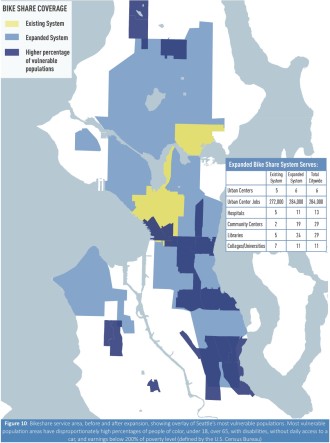Seattle begins bike share takeover, budgets for system expansion

A plan to expand Pronto aims to reach "vulnerable" populations. Map from Seattle's pending TIGER grant application.
With a big plan for expanding Pronto Cycle Share, including a one-time budget expense to make it happen, the city has begun taking a more central role in the bike share system.
"Bike share really expands the reach of the transit system, particularly when you add e-bikes in there," said SDOT Director Scott Kubly. And as other cities have learned, the bigger the system gets, the "network effect" makes the system both more useful and more financially stable.
That's why Mayor Ed Murray included $5 million in his proposed 2016 city budget to help expand Pronto. If the city receives the funding to build the full plan outlined in a pending federal grant proposal, bike share could be within an easy walk of 62 percent of Seattle residents.
But with that much city skin in the game, leaders understandably want to have a more direct role in the system operations and ownership.
"We are working with Puget Sound Bike Share on having the city take over operations of pronto bike share," said Kubly.
At the moment, the PSBS Board is still in charge. But as we reported in August, PSBS Executive Director Holly Houser has stepped down, leaving the organization unstaffed. SDOT's Chief of Active Transportation and Partnerships Nicole Freedman is going to work with PSBS to help keep things moving in Houser's absence, Kubly said.
Pronto is the branded name for the system, which is operated and staffed by an out-of-town company called Motivate (formerly Alta Bicycle Share). But the system is largely owned by a non-profit organization called Puget Sound Bike Share, which has public and private board partners from all over the region and is funded by grants and sponsors. Alaska Airlines is the biggest sponsor, contributing $2.5 million over five years to brand the first 500 bikes now on the streets.
The city has not yet received an answer to its federal TIGER grant proposal, which included $10 million to dramatically expand the bike share system. The city may receive some, all or none of that request. Kubly said they hope to hear an answer this month.
The $5 million proposed in the mayor's budget is intended to be a match to build on any grant money received. If no grant funds come through, the city still intends to invest that $5 million into bike share, but they will need to reassess what that expansion will look like.
"Do we want to have a larger expansion with non-electric bikes, or a smaller expansion with electric bikes?" Kubly asked.
Also, will the city and Motivate be able to retrofit the existing bikes and docks to support electric assist motors? They're looking into it and hope to pilot an option in 2016 ahead of a bigger launch in early 2017.
The city's expansion plans represent a significant change in direction from King County's original bike share business plan. The original plan would have grown slowly over time from the current service area, adding station density and area with each phase and building satellite systems in several Eastside communities. The whole system would be under the control of one non-profit entity.
But even years into a successful system build-out, many of Seattle's lowest-income neighborhoods would still be left out under the previous plan. Neighborhoods north and south of the city's more dense central neighborhoods could use better access to transit the most, but stations there may not be as financially self-sustaining due to lower housing and commercial density. That's why the original plan for slow, self-sustained expansion left them out.
But with the city making a direct investment into more neighborhoods, the system can reach further without waiting years and years to crawl beyond Wallingford or the Central District. But that means tossing the old regional business model out the window and following the lead of bigger systems around the country where cities have a more direct hand in where stations go and how they get funded.
The city is currently working with PSBS and Motivate to figure out how a transfer to the city would work and how to craft a contract that adequately protects the city finances.
"We're confident that we can operate the system without exposing the city to financial loss on the operating side."
But what does this all mean for the regional bike share vision?
"There are lots of good models around the country to how multi-jurisdictional systems work," said Kubly. The goal is to have jurisdictions control their own portions, "but to the customer it's seamless."
So, for example, Kirkland, Bellevue, Redmond and Issaquah just received state funding to launch bike share. Seattle wouldn't own or run their systems, but the goal would be a system where Seattle and Eastside Pronto members and day-use passholders would be able to use both systems.
And with plans in the works to integrate ORCA cards into Pronto and the possibility of rethinking the pay structure to be more like a transit fare, you can begin to see how bike share can really expand the reach of our region's transit network.